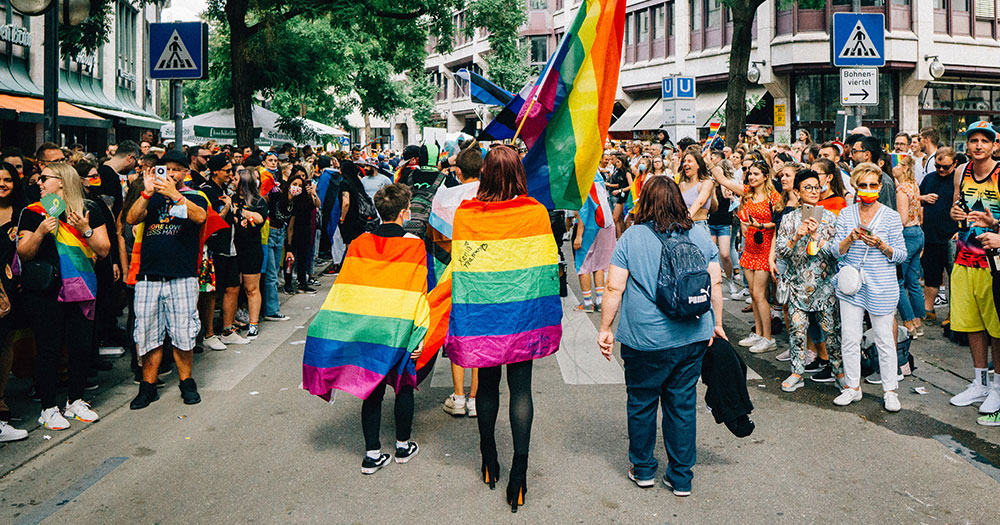While LGBTQ+ activists and citizens fight a fierce battle to make their love legal all over the world, oppressive legislation still exists and is actively being used to criminalise same-sex marriage and sexual relations.
Distressingly, there are still 71 jurisdictions that criminalise same-sex marriage and same-sex relationships. The majority of these jurisdictions explicitly criminalise sex between men via ‘sodomy’, ‘buggery’ and ‘unnatural offences’ laws. Almost half of them are Commonwealth jurisdictions.
There are 43 jurisdictions that criminalise private, consensual sexual activity between women using laws against ‘lesbianism’, ‘sexual relations with a person of the same sex’ and ‘gross indecency’.
However, even in jurisdictions that do not explicitly criminalise women, lesbians and bisexual women have been subjected to arrest or threat of arrest.
Though countries, such as Sudan, have more recently repealed the harshest anti-LGBTQ+ legislation, there are currently 11 jurisdictions that still openly impose, or threaten, the death penalty for consensual same-sex activity: Afghanistan, Brunei, Iran, Iraq, Mauritania, Nigeria, Saudi Arabia, Somalia, United Arab Emirates, Yemen, and Qatar.
In Qatar, where Muslims make up approximately 65.5% per cent of the population, the death penalty only applies to Muslims.
In the Middle East, there are more countries that have anti-gay laws than those that don’t. Bahrain, Israel and Jordan are the only countries in the region that do not outlaw homosexuality.
However, even in countries where homosexuality is banned but not punishable by death, members of the LGBTQ+ community face punishments including flogging or imprisonment.
A recent report by ILGA, the International Lesbian, Gay, Bisexual, Trans and Intersex Association, finds that arrests and prosecutions of LGBTQ+ persons continue worldwide.
Countries in which LGBTQ+ people are considered to be most under threat include Iraq, Iran, Honduras, Uganda, Russia, Egypt and Nigeria.
Many countries in Asia have no specific laws against homosexuality, with Taiwan becoming the first in the region to allow gay marriage; however, members of the LGBTQ+ community still face high levels of discrimination and intolerance.
Though gay rights are constitutionally enshrined in most of South and North America, with exceptions in areas such as the Caribbean, LGBTQ+ people experience shockingly high rates of violent crimes. This year has been the worst in history for Trans murders, with the majority of deaths occurring in Central and South America.
In Europe, Hungary does not recognise same-sex marriage, has banned same-sex couples from adopting children and passed a law preventing people from legally changing their gender.
Human Rights Watch has also warned that so-called “LGBT Ideology Free Zones” or anti-LGBT “Family Charters” in almost 100 Polish regions, towns and cities also breach the countries “legal obligations under the EU Charter of Fundamental Rights and a European Council directive for equal treatment in employment and occupation”.
South Africa is the sole nation on the African continent to allow gay marriage, where it became legal in 2006.
Amnesty International has warned that “legal rights are diminishing for lesbian, gay, bisexual, transgender and intersex people across the African continent”.
Though same-sex sexual acts are legal in 121 countries, there are currently only 30 countries in the world that recognise same-sex marriage.
Significant progress is yet to be made to ensure that LGBTQ+ people are protected under the law. Even in countries where same-sex marriage and relationships are legal, such as Ireland, there is still a need for full social acceptance of LGBTQ+ folks.
Until the day that every human can love who they love, in absence of persecution and stigma, we must continue to fight against ignorance and bigotry.
© 2021 GCN (Gay Community News). All rights reserved.
Support GCN
GCN is a free, vital resource for Ireland’s LGBTQ+ community since 1988.
GCN is a trading name of National LGBT Federation CLG, a registered charity - Charity Number: 20034580.
GCN relies on the generous support of the community and allies to sustain the crucial work that we do. Producing GCN is costly, and, in an industry which has been hugely impacted by rising costs, we need your support to help sustain and grow this vital resource.
Supporting GCN for as little as €1.99 per month will help us continue our work as Ireland’s free, independent LGBTQ+ media.
